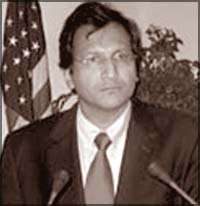Confronting false dichotomies
|
Excerpts of the keynote
address by Sri Lankan Ambassador to Belgium, Luxembourg and the
EU Ravinatha P. Aryasinha at the Eurojust Tactical meeting on
“LTTE Front Organisations” on March 30 and 31 at the Hague.
|
Terrorist front organisation phenomenon is not a Sri Lankan problem
alone. It remains a fundamental problem that all nations big and small,
developed and developing, rich and poor, militarily powerful and weak,
in all corners of the world have to confront, if we are to succeed in
what is referred to as “the fight against terrorism”.
Contemporary counterterrorism efforts as an instrument for attaining
peace, have been described as a global ‘public good’. It is
non-excludable and non-rival in consumption, and its benefits reach
across borders, generations and population groups and once accomplished,
the whole of humanity benefits.
It is for this reason that for the purpose of this discussion, I
posit the issue of the need to take action against terrorist front
organisations, as a public good.
|

Ravinatha P. Aryasinha |
The ‘front organisation phenomenon’
Not only are these front organisations a problem as they serve
terrorists and contributes to the mayhem they create, they also
effectively exploit the generosity and decency of civic-minded people in
your countries. Additionally, they undermine your financial systems,
particularly at a time when it already is in deep crisis.
It is widely known that what sustains terrorist organizations the
world over is money, and that while freezing terrorist funds have proved
to be an effective means of disrupting terrorist activity, following the
money has enabled investigators to uncover previously unknown links
between terrorist operatives and even to thwart such activity.
Fund channelling
A major channel for its supply are the respective Diaspora, who may
be mobilized through ‘front organizations’ that take many forms -
religious, cultural, humanitarian, women, youth, students and sports.
Front organisations by their very definition, are entities set up and
controlled by another organisation, but which espouse the
objectives/policies of their parent body. The advantage front
organisations have is that they can act for the parent group, without
the actions being attributed to the parent group.
|

Terrorism remains a fundamental problem that all nations
confront. AFP |
In the political sphere, such front organizations can increase the
legitimacy of the causes they represent, neutralizing the stigma that
might be attached to already discredited organizations which espouse the
same cause.
Until recent times, it is mostly charities and non-profit
organisations that were regarded as playing this role.
However, in more recent times, following the advances in ICT and
banking technologies in a globalized world, we have witnessed companies,
media outlets, religious centres and even educational institutions
serving as front organisations for terrorists.
It is in the above context that front organizations become a valuable
vehicle through which terrorist groups could continue their activities,
inspite of proscriptions and serious limitations imposed upon them,
particularly in the aftermath of 9/11.
Confronting terrorist front organizations
While charity remains a value of paramount importance to donors and
recipients alike, illicit actors have amply demonstrated that the
charitable sector is vulnerable to abuse.
Devising policies that protect charities from abuse, even as they
promote charitable giving, remains a major challenge.
There are a number of modalities that have been operationalized which
provides for dealing with the problem of charities and other bodies
serving as front organizations, that contribute towards the perpetuation
of terrorism.
These include -the UN’s Security Council resolutions 1267 and 1373,
the US Executive Order 13224 and sections of the UK’s Terrorism Acts
2000 and 2006. While conscious of the work being done by the EU, through
the UN and also within the Financial Action Task Force (FATF) of the
OECD, to combat money laundering and terrorist financing, I am not aware
of any commensurate specific collective measures operationalized by the
EU, that sufficiently address the specific phenomenon of terrorist front
organizations, with the efficacy this ‘moving target’ demands.
Counter-terrorism
This seems unfortunate for an institution that has been considerably
pro-active in counter-terrorism and since the entry into force of the
Amsterdam Treaty in June 1999 has adopted numerous measures to develop
the European criminal law-enforcement area, along with agencies such as
Eurojust, Europol and SitCen.
Within months after 9/11, the EU adopted Council Common Position
2001/931/CFSP on the application of specific measures to combat
terrorism (which lays down the criteria for listing persons, groups or
entities involved in terrorist acts and identifies the actions that
constitute terrorist acts) and Council Regulation (EC) No 2580/2001 on
specific restrictive measures directed against certain persons and
entities with a view to combating terrorism (which provides for freezing
of all funds, other financial assets and economic resources belonging to
the persons, groups and entities concerned).
On June 22, 2002, the EU adopted framework decision 2002/475/JHA on
Combating Terrorism. On November 24, 2005, Council decision 14781/1/05
spelt out an EU strategy “for Combating Radicalization and Recruitment
to Terrorism” and the EU Counter-Terrorism Strategy unveiled on November
30, 2005 lists as key priority initiatives “to pursue and investigate
terrorists across our borders and globally” while continuing to “support
the efforts of Member States to disrupt terrorists by encouraging the
exchange of information and intelligence between them.”
As part of its Action Plan to combat terrorism, the EU has also taken
measures to improve cooperation among the intelligence services,
national authorities and emergency services of member states to
adequately assess terrorist threats.
More recently, on July 17, 2008 the EU proposed a revised strategy on
terrorist financing, and on November 27, 2008 through 15139/08 and
8807/08 the European Council adopted a framework decision amending
framework decision 2002/475/JHA, to extend the offense of ‘terrorism’ to
include three new offenses in EU legislation: Public provocation to
commit a terrorist offence (including dissemination of terrorism
propaganda through internet), recruitment for terrorism, and Training
for terrorism.
To be continued
|



